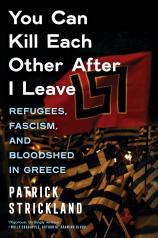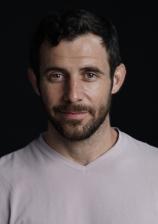Interview: April 17, 2025
Based on hundreds of hours of on-the-ground reporting, YOU CAN KILL EACH OTHER AFTER I LEAVE is a remarkable work of narrative nonfiction and compelling journalism that tells how Greece's violent far right is trying to destroy the birthplace of democracy. In this interview conducted by Michael Barson, Senior Publicity Executive at Melville House, Patrick Strickland talks about what inspired him to write this book, why he relocated to Greece eight years ago, the importance of including personal stories in his work, and two upcoming projects that revolve around his home state of Texas.
Question: How did a journalist from Texas like yourself end up so connected to Greece? And for how many years have you lived overseas now?
Patrick Strickland: That’s an interesting question. I started out in freelance journalism in the Middle East, in fact, and lived in that region for the first seven years of my career. I was interested in the world and learning about it, so I started freelancing in Israel/Palestine and stayed there from 2011 to 2015. I was mostly covering refugee issues, conflict, and other human rights-related news. I learned Arabic there and briefly taught at a high school. It was a very formative moment in life. I later lived in Lebanon and Qatar, where I worked at Al Jazeera English, but I started traveling to Greece in the fall of 2015.
At the time, the war in Syria, economic catastrophes all over, and unrest in Iraq, Afghanistan and elsewhere were driving a vast uptick in migration to Europe. Nearly a million people crossed through Greece by the end of 2015. Borders started to slam shut not long after, and many people ended up marooned in Greece. I became connected to the place, first and foremost, because of the immense solidarity I witnessed early on. Activists and humanitarians had really banded together to help make the journey of displaced people easier, and that was something to see.
I eventually moved to Greece late in 2017 and have been back and forth ever since.
Q: So you started reporting in Greece a decade ago. What inspired you to keep at that work for so long?
PS: Well, there was ongoing violence, too, and that grew more severe over time. That meant violence on the borders, at the hands of the far right, and, of course, the sometimes lethal risks of the journey itself.
On top of that, over the years, editors would sometimes tell me that readers had “refugee fatigue,” that it was too hard to justify covering an issue fewer and fewer people read about. To be honest, that just inspired me to stick with it. I thought that whatever “fatigue” readers (or, more likely, the editors themselves) felt in no way compared to what the refugees and migrants themselves endured.
Q: Your previous book, THE MARAUDERS, is set on the border between Mexico and Arizona, but it now seems to overlap in a number of ways with your investigative reporting in this book on the current state of Greece.
PS: You just have to scan the headlines on any given day, and you’ll see the parallels. In Greece, a neo-Nazi party had stormed into the parliament in 2012 after seizing discontent with the country’s economic crisis and redirecting the blame onto the backs of displaced people. It worked for them for a period --- it’s an easy explanation, after all. In the US, only five years later, we had neo-Nazis carrying out gruesome displays of violence in Charlottesville, where one organizer even said he had drawn inspiration from the Greek neo-Nazi Golden Dawn party.
Likewise, border vigilantes for years have caused havoc in communities on the US-Mexico border. In 2023, similar militia-like groups cropped up in the Greek borderlands with Turkey. These books are set in different countries, but THE MARAUDERS and YOU CAN KILL EACH OTHER AFTER I LEAVE are very similar in a sense.
Q: Now that you are temporarily back in the Dallas area to help promote this new book, are you noticing any changes in the atmosphere there compared to the point at which you moved overseas?
PS: Undoubtedly. I first left the US nearly 15 years ago, and except for some two years during the pandemic, I have lived abroad ever since. One challenge of reporting on international issues is getting the interest of American readers. That’s always been the case, at least in my experience, and it’s sometimes a struggle to get folks to see why what’s happening in, say, Greece might be relevant to what’s happening in the US.
That said, there seems to be a shift in that now. With migration, the border and fascism being centerpieces of the public conversation in the US, I’ve noticed more people taking a harder look at the rest of the world to make sense of the situation they’re seeing in front of them. That’s a shift I’m glad to see. The US is, after all, just one part of a very large world.
Q: YOU CAN KILL EACH OTHER AFTER I LEAVE places a lot of focus on the people at the heart of the story. What drives you to spend so much time compiling these personal stories?
PS: Speaking for myself, I don’t want to read books about big issues that don’t show you the impact they have on normal people. The displaced people who fled war and conflict and sought refuge in Europe are normal folks like anyone else, anywhere else. They have endured extraordinary situations and hardships, but most people want the same thing: a stable life.
I hope readers see that in the people I write about --- the Pakistani workers in Greece who send money back home to their families, the Syrians who never would have left their country if war hadn’t torn it apart, and, of course, the Greeks who refused to watch on idly as refugees and migrants were subjected to threats, harassment and violence.
That last point is one that is especially important to me. Everywhere you go, there are people who resist hate and fear. That’s one piece of what I’ve tried to highlight in YOU CAN KILL EACH OTHER AFTER I LEAVE, as well as in my first two books. My reporting on these issues keys in on the folks who stand up and object and put their own necks on the line.
Q: Do you have a new project in mind yet? And in what corner of the world would you like to focus your reporting next?
PS: At the moment, I’m working on another book, this time fiction, which also will be published by Melville House. It’s mostly set in Texas, and it’s something I’ve been plugging away at for six or so years. It deals a lot with a particular period of time I know well, when down-and-out kids (and others) in Texas were struggling with the corrosive impacts of living in a country that doesn’t much care about them. But it also deals with some of the issues I frequent in my reporting: extremism, poverty and conspiracy theories.
At the same time, I’ve recently started down a truly deep rabbit hole for a nonfiction project, perhaps a book, about socialist immigrants in Texas in the late 1800s and early 1900s. It is, I think, a wildly interesting window into a moment in time when this state --- and the country --- might’ve gone in a different direction and looked a whole lot different.




